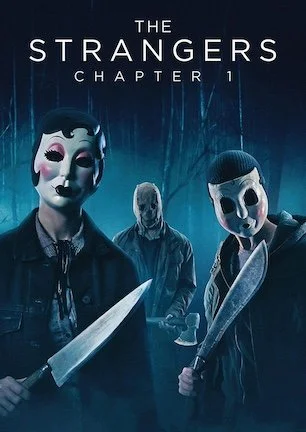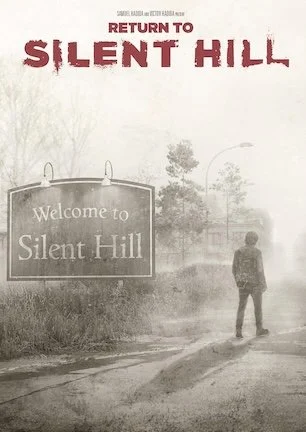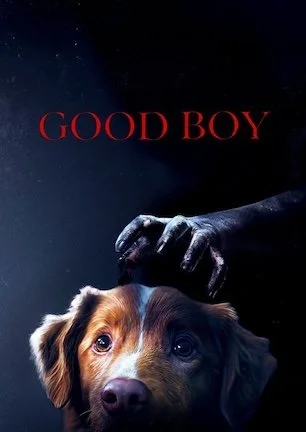Studio: Lionsgate
Director: Renny Harlin
Writer: Alan R. Cohen, Alan Freedland
Producer: Courtney Solomon, Mark Canton, Christopher Milburn, Gary Raskin, Alastair Burlingham, Charlie Dombek
Stars: Madelaine Petsch, Froy Gutierrez, Gabriel Basso, Ema Horvath, Ella Bruccoleri, Richard Brake, Brooke Johnson
Review Score:
Summary:
Three masked intruders terrorize a young couple trapped inside a remote rental home.
Review:
I'm not sure how "The Strangers: Chapter 1" wants viewers to feel about its protagonists. Following a senseless prologue that does nothing except satisfy an imaginary obligation for a pre-title jolt, Maya and Ryan fall out of their handsome Hollywood headshots and into a car driving "somewhere in Oregon." (Venus, to be exact; I don't know why text says "somewhere" when dialogue specifies the location.) With 300 more miles to go until Portland, Ryan suggests stopping for a bite. Since this is a horror movie, of course they stop at a small-town diner where all of the rural-looking locals eye these two city-slicking outsiders suspiciously.
There's no trucker with a mesh baseball cap, although there is a grim-faced sheriff, an unkempt mechanic with his arms crossed, a flannel-clad guy sporting a neckbeard, and a waitress who semi-snickers when Ryan asks about vegetarian options on the menu. The diner owner adds to the haze of discomfort by taking umbrage at the revelation that this picture-perfect couple has been dating for five years without getting married. These patrons act oddly, but they're not openly hostile. So I guess what I'm asking is, are we supposed to have sympathy for Maya and Ryan's minor mistreatment, or are they supposed to be seen as intrusive, privileged a-holes since they're discussing a friend's destination birthday in Greece and breaking greasy spoon decorum by asking about salad?
Maya and Ryan remain relatively respectful until they finish their meals and discover their car won't start. That's when Ryan wags a figurative finger at the weirdo mechanic by leveling an accusation of sabotage. Offending the locals, especially ones with the power to make you mobile again, is always a no-no in fright films. But Ryan seems right to be wary of how his new car suddenly died, and how this grim guy happens to have a whole itinerary up his sleeve for Maya and Ryan to rent a remote house while they wait for repairs overnight. Once again, whose side should I be on here?
In general, I'm not really sure what "The Strangers: Chapter 1" is doing with anyone at all. The first in a trilogy, "Chapter 1" tells an incomplete tale that doesn't work as a standalone story because it evidently requires two other chapters for any of the elements introduced to provide a payoff.
In addition to the side-eyeing country folk exchanging knowing stares only they understand, there are two instances where other kooks, a pair of biking boys and a pair of burger stand cooks, pass out flyers for a strange Sunday church gathering. Richard Brake clearly wasn't cast to sit in a single scene where he doesn't speak a word, so his sheriff character should presumably play a larger part in the sequels. Is the mechanic really up to no good? Are one or more of these townspeople secretly under the murderers' masks? And if the diner is also involved in some grander strangers-related conspiracy, why does the counter display a missing person poster for the man who gets axed in the opening?
None of those questions are answered in this movie, turning each of these inclusions into seeds that don't sprout fruit. As soon as Maya and Ryan step out of town and into the house, "The Strangers: Chapter 1" devolves into a rudimentary cat-and-mouse chase where the two of them run, hide, and occasionally fight back against masked intruders for 45 minutes. Look at the end credits, where actors are listed in the order in which they appear, and you'll see a long list of characters that don't actually show up onscreen. "Chapter 1" ends with only two faces featured in a hospital scene. But there was apparently supposed to be a full roster of new people including a nurse named Danica, an orderly named Richard, and a multitude of other names, including possibly two new strangers called Ghostskull and Witchface. Whatever all of this was intended to be was obviously cut, making "Chapter 1's" non-ending less of a cliffhanger and more of a cheat to chop off even more of the movie.
If "The Strangers: Chapter 1" means to mythologize its titular antagonists by fleshing out their fiction, then the filmmakers are missing the point of why the original movie became the hallmark of home invasion horror. "The Strangers" (review here) was skin-crawlingly eerie because its villains were exactly what the title said they were. We didn't know who was wearing the masks. We didn't find out what they wanted. We weren't told why they did what they did. That's why they were scary. Potentially giving them identities, backstories, and motivations isn't just a mistake, it's anathema to what makes the masked strangers so terrifying in the first place. But if this trilogy doesn't deliver on the additional development "Chapter 1" appears to be planting, then what will these three movies be other than redundant rehashes of a simple "three killers terrorize two people" plot that was already perfected in 2008?
Regardless of which way the trilogy goes, "The Strangers: Chapter 1" can't stand on its own two feet since at least one more movie is necessary to make any sense out of this film's first act. Ever since Marvel's massive success, studios have been putting carts before horses by announcing series that die after one dismal entry like "The Exorcist: Believer" (review here), or undoing plans for entire continuities like the aborted "Dark Universe" project. "The Strangers" doesn't have a chance to change course since all three chapters were filmed at once. But I'd bet if Lionsgate shelved the other two films due to "Chapter 1's" disappointing deja vu, forgetful fans would be perfectly fine not seeing how this recycled concept ultimately plays out.
NOTE: There is a mid-credits scene.
Review Score: 30






While the 110-minute runtime could use a trim to maintain more energy, “Redux Redux” is an easy recommend for anyone who enjoys low-key sci-fi.